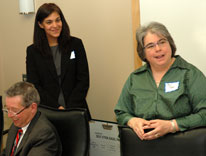
More than 250,000 people die annually in the United States from cardiac arrest. If bystanders knew where to find an automated external defibrillator (AED), that number could drop significantly.
Developing a state AED registry with the potential to grow into a national database is the goal of the Pilot AED Registry, which is being spearheaded by the University of Colorado School of Medicine. The pilot project began in November 2010 when the U.S. Food and Drug Administration tapped the CU medical school to help identify and log AEDs in the community.
A group of more than 30 stakeholders -- from emergency responders and policy makers to AED manufacturers and cardiac arrest victims -- met today at Anschutz Medical Campus to move the project into its action stage. Comilla Sasson, MD, with the Department of Emergency Medicine of the CU medical school, said the pilot registry is planned to launch in October 2012.
"One of the most important things we have here today are the folks who have been touched by cardiac arrest," Sasson said. "That's what I want to come back to -- we all have the same mission."
Three survivors told their stories, all saying that if it weren't for someone having access to an AED during their cardiac arrest, they wouldn't have survived.
A tragic story was shared by George Wheeler Jr., who told of how his son died in August 2001 during a workout with the Northwestern University football team. An AED was nowhere on the field that day. A state law has since been passed, the Rashidi A. Wheeler law, that requires AEDs at outdoor athletic facilities.
"Everyone is just blown away" by Wheeler's story, Sasson said. "Here's this massive university and nobody knew enough to actually go get and use this device."
Sasson presented statistics that spell out the problem. Only one in 10 people who suffer cardiac arrest survives. One in five cardiac arrests happen in a public location, and an AED is used in only one of every 10 of the those arrests.
"There's that huge gap," Sasson said. "Presumably, these are all people who are out walking and talking and have an arrest. We have the ability to help them, and we don't. We don't know where (the AEDs) are."
Currently, Denver and other cities collect some information about AEDs, but little is known about the location and numbers of these devices throughout the communities. With AEDs used in fewer than 3 percent of cardiac arrest cases, the goal is to get that percentage much higher -- through a registry of their locations as well as greater public awareness of the devices.
The pilot will start as a state registry and expand, by partnering with Cardiac Arrest Registry to Enhance Survival, to a national registry. The complex effort requires a multidisciplinary, collaborative approach, Sasson said.
"Hopefully, we'll be the leader in terms of figuring out all the rural, frontier and urban issues that we know are going to happen," she said. "How do we encourage people from all walks of life, essentially, to participate in this and then how do we integrate that data into the 911 system because every 911 system is completely different."
Welcoming the group to campus for its all-day work session were Richard Krugman, MD, dean of the CU medical school, and Richard Zane, MD, chair of the Emergency Medicine department.
Zane said "there is no subtlety" in the university's innovative approaches to science. "This program fits squarely in the sweet spot of Emergency Medicine, where we are unabashedly committed to saving lives," he said. "We care for our community in this way. The programs we are going to implement are going to be national models. You are looking at a completely different way for approaching cardiac arrest. The lives you save by successfully completing this program are going to be exponential."
The Denver pilot project is part of a broader FDA initiative to improve AEDs.
(Photo: Mary Tappe, right, a cardiac arrest survivor, talks at the Pilot AED Registry meeting as Comilla Sasson, MD, Department of Emergency Medicine, looks on).
